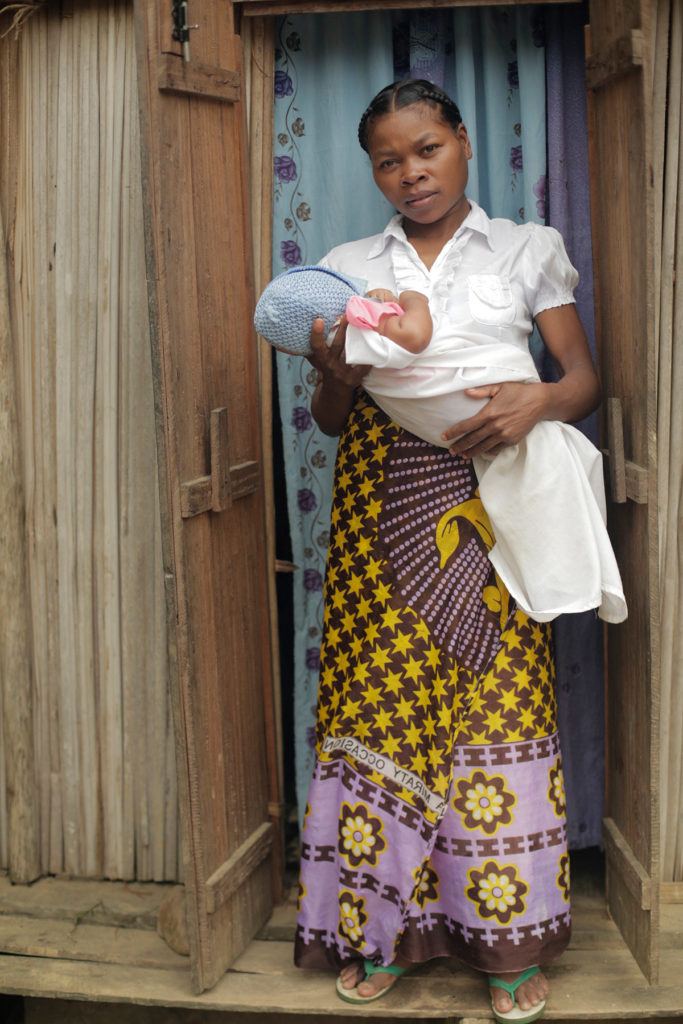 Transforming one of the world’s poorest nations into a center of health, resilience, and innovation.
Transforming one of the world’s poorest nations into a center of health, resilience, and innovation.
The Harvard T.H. Chan School of Public Health has an unprecedented opportunity to help the government of Madagascar improve health and well-being for tens of millions of people. A Harvard-led collaboration will create public health information systems that are multi-sectoral and resilient, driving cooperation across climate, environmental, agricultural, and health sectors to address the social and environmental determinants of health.
Madagascar’s people face a 78% poverty rate, one of the highest maternal mortality rates in the world, a 6% death rate for children under 5, and malnutrition that stunts the growth of more than half the population. Most people live in rural communities isolated by difficult terrain, making health care and public health interventions difficult to deliver and administrate. Half of Madagascar’s population lives 5 km or more from a government-run clinic. As climate change-related droughts, floods, and other forms of rapid environmental change ravage the agricultural sector and human beings alike, bringing food insecurity and associated violence, the situation will worsen without bold, coordinated action.
African nations are emerging as a new center of global innovation, and Malagasy government ministries have long consulted with Harvard Chan School faculty to build out Madagascar’s public health infrastructure. Could a country beset by so many struggles manage to leapfrog others, avoiding their missteps to institute a health care system that is smart, sustainable, and ready to face a volatile future?
With your help, it can.
Click here to support this initiativeIn recent years, the Malagasy government has renewed its commitment to implementing universal health care, and Harvard is in the perfect position to assist. A World Bank Group collaboration led by Harvard Chan faculty developed a first-of-its-kind strategy: with enhanced data systems feeding the work of multiple Malagasy government ministries, the country can move toward universal health care, advanced public health, and environmental resilience. Harvard expertise can make the plan a reality.
Interlocking Objectives
The Climate, Health, and Agricultural Monitoring and Prediction (CHAMP) Initiative led by the Harvard Chan School and Malagasy ministries will build the bones of a strong universal public health system in Madagascar:
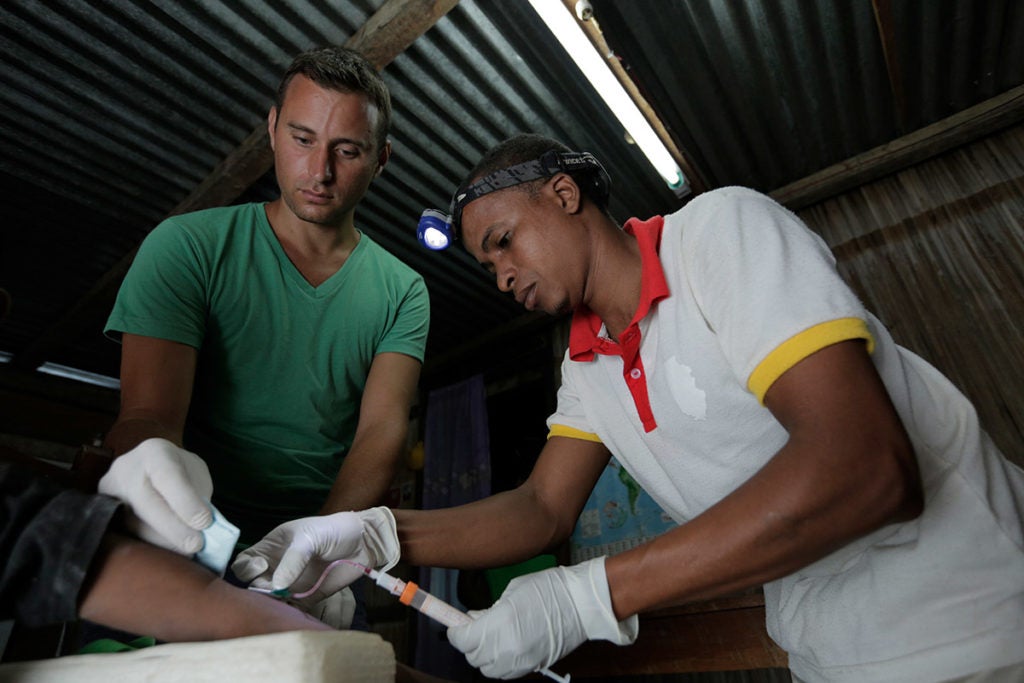 We will build up Madagascar’s information infrastructure, linking remotely sensed satellite observations with community-based sentinel health surveillance, to enable health research, rapid prediction, and public health planning.
We will build up Madagascar’s information infrastructure, linking remotely sensed satellite observations with community-based sentinel health surveillance, to enable health research, rapid prediction, and public health planning.- We will help translate cutting-edge observations and predictions into inter-ministerial policy action across health, agriculture, environment, rural development, and more to create systemic interventions that promote health and well-being.
The result will be a “climate-smart” public health system that paints a full picture of conditions affecting human well-being and enables multi-sector interventions to help Madagascar’s people thrive despite social and environmental challenges.
Why Public Health Must Be Climate-Smart
Climate change and other environmental challenges have real and immediate impacts on human health, especially in vulnerable nations like Madagascar. For example:
- Harvard Chan researcher Chris Golden has found that many Malagasy people rely on wild foods as a source of crucial nutrients. Climate-induced changes in fisheries, over-hunting of wild mammals, and habitat destruction could all worsen Madagascar’s severe malnutrition epidemic.
- Climate change and ecological destruction affect the transmission of infectious diseases: increased temperature and rainfall helps malaria-carrying mosquitos thrive, while habitat destruction can damage the predator-prey dynamics that keep parasitic diseases like schistosomiasis under control.
- Drought, fire, and floods may induce crop failure and malnutrition.
- Increasing cyclonic activity can lead to the destruction of existing healthcare facilities and to long-standing repercussions to mental health.
To be focused and effective, public health efforts must account for the wider systems affecting human wellbeing. As climate change causes ever more disastrous perturbations in our environment, governments must learn to predict and manage the fallout.
Information Infrastructure for Resilience
Madagascar has a limited centralized data collection system to monitor public health and disease, and no surveillance system for environmental trends that could influence health. A successful rollout of climate-smart public health will require pinpoint awareness of developments in environmental and human health, allowing for responsive interventions and long-term planning to address health threats.
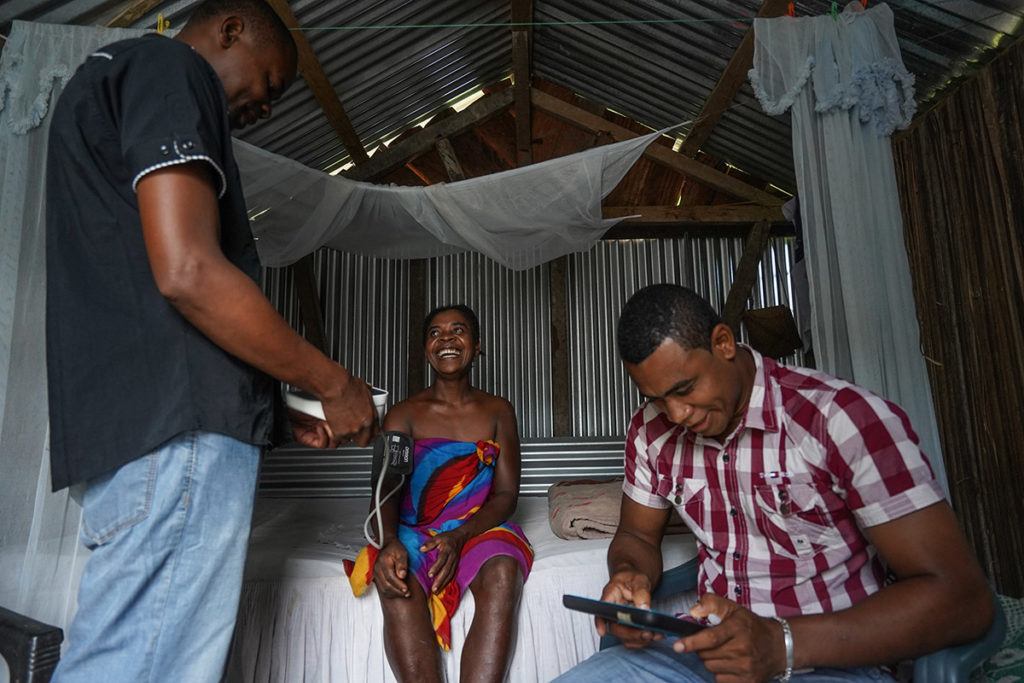 The Harvard Chan School and its partners in Madagascar will create a data system that allows the Malagasy government, health workers, and NGOs to predict and manage developing health crises and respond to current need. We will integrate existing information from government-run clinics with the development of new community-centered sentinel surveillance sites to develop a system that facilitates forecasting and planning, and build data collection capacity to allow faster, more comprehensive insight.
The Harvard Chan School and its partners in Madagascar will create a data system that allows the Malagasy government, health workers, and NGOs to predict and manage developing health crises and respond to current need. We will integrate existing information from government-run clinics with the development of new community-centered sentinel surveillance sites to develop a system that facilitates forecasting and planning, and build data collection capacity to allow faster, more comprehensive insight.
Government plans to introduce two community health workers (CHWs) to each of Madagascar’s 17,000 communities could greatly expand government’s, NGOs’, and academia’s access to health-related information with our help. Our plan outlines the development of strategic sentinel sites where our Harvard Chan team will train CHWs in information collection, and will then benefit from the ability to map and predict health trends and triage resources to best effect.
Meanwhile, Madagascar’s health ministry, instead of facing a two-month delay in receiving reports of hand-collected data, will have instantaneous access to updated information. Civil servants will be able to catch emerging epidemics and halt disease in its tracks by sending out resources and medications to communities in need. NGOs and government workers can use the system to inform nutrition interventions like food aid, interventions to curb malaria spread, and more. These data will also inform Harvard research on environmental change and human nutrition, and the ecology and epidemiology of water-borne and vector-borne diseases, and more.
The CHAMP information system will incorporate climate, agricultural, and other data on environmental conditions that affect health. Harvard researchers, nonprofit partners, and Malagasy civil servants will work with technologies developed by BAO Systems—a social enterprise firm with purpose-built epidemiological data infrastructure—to develop an information platform that is resilient, flexible, and smart.
Collaboration for a Sustainable and Healthy Society
What can be accomplished when government ministries recognize their interrelated responsibilities for human well-being?
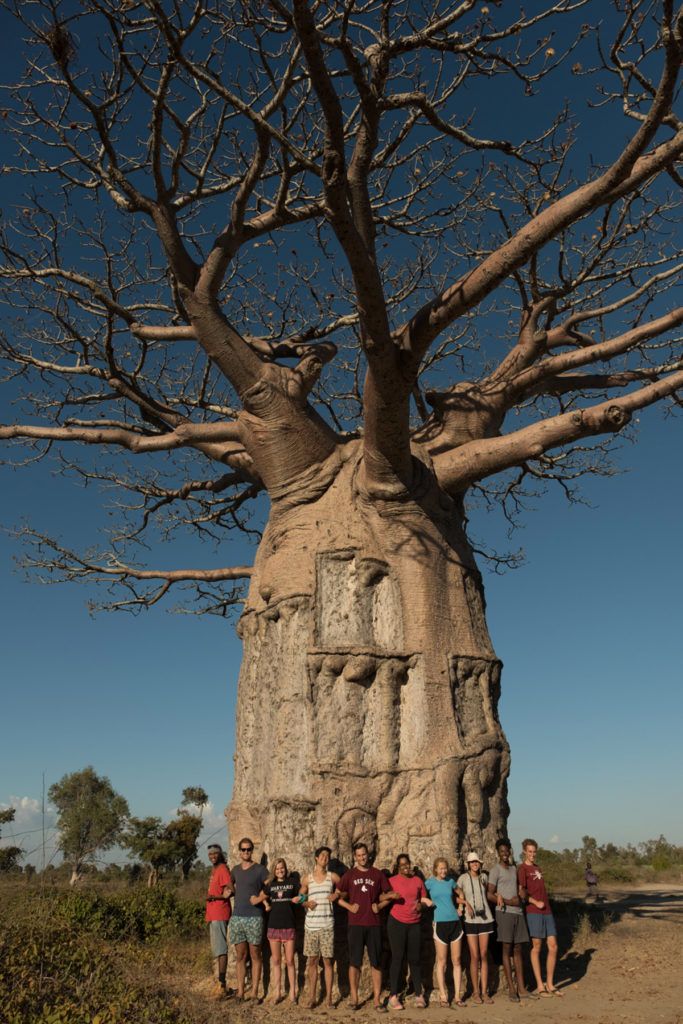 Four Malagasy government ministries have signed off on a joint approach to creating climate-smart public health systems innovated by Harvard Chan researchers. This prime example of a North-South partnership will allow Madagascar’s government to truly make use of the comprehensive data it will soon be gathering, and assist ministries in taking coordinated action.
Four Malagasy government ministries have signed off on a joint approach to creating climate-smart public health systems innovated by Harvard Chan researchers. This prime example of a North-South partnership will allow Madagascar’s government to truly make use of the comprehensive data it will soon be gathering, and assist ministries in taking coordinated action.
The first application of this systems strengthening work will be in maternal and child health. Madagascar’s maternal mortality rate is 478 deaths for every 100,000 live births. The Harvard Chan School will introduce known interventions to communities across Madagascar through our on-the-ground connections and through the country’s new network of community health workers. Harvard Chan faculty will contribute their expertise in areas including parental feeding behaviors and child nutrition, the psychological impacts and drivers of maternal mortality, and connections between reproductive health and sustainable development. We will document improvements in health due to these interventions through longitudinal research enabled by the new information infrastructure.
Harvard Chan’s Partners:
- Madagascar Ministry of Health; Ministry of Agriculture, Livestock & Fishing; Ministry of Environment and Sustainable Development; Ministry of Transport, Tourism, and Meteorology
- BAO Systems
- Management Sciences for Health
- Madagascar’s Consortium of Doctoral Education Programs
- MAHERY (Madagascar Health and Environmental Research)
Harvard Chan research faculty:
- Nutrition lead: Chris Golden
- Maternal and Child Health lead: Ana Langer
- Infectious Disease Ecology lead: Marcia Castro
- Climate Change lead: Peter Huybers
- Mental Health lead: Karestan Koenen
- Remote Sensing and Algorithmic Development lead: Milind Tambe
The Plan
Over the next five years, the Climate, Health, and Agricultural Monitoring and Prediction (CHAMP) initiative, led by the Harvard Chan School, will:
Years 1 and 2
- Create a cutting-edge public health information system, incorporating existing data from Madagascar’s health clinics to develop a coherent database with capacity for cross-regional and longitudinal analysis
- Work with and help train community health workers as they deploy to communities across Madagascar.
- Begin training community health workers.
- Begin collecting new community-level, country-wide sentinel surveillance observations across public health, ecology, climate, agriculture/land use, and other areas to enable analytical and forecasting capabilities.
- Integrate data streams from climate, ecological, and agricultural data (both remotely sensed and locally collected) to develop an interoperable information system
- Begin health systems strengthening in maternal and child health.
Year 3
- Continue to refine data systems, including re-training of CHWs.
- Begin capacity building for policy/ministerial interventions using newly developed Climate-Smart Public Health evidence base.
- Train students in the new doctoral program of public health and health professionals in epidemiology, biostatistics, mental health, and other areas of integrative intervention.
- Translate these intersectoral mechanistic observations and analyses to enhance planning abilities across ministries.
Years 4 and 5
- Pilot inter-ministerial interventions based on Climate-Smart Public Health.
- With our refined public health information platform, we will evaluate the impact of interventions and adapt interventions accordingly.
A basis for success
Harvard Chan faculty are involved in public health initiatives across Madagascar and have deep relationships with Malagasy government ministries, especially the Ministry of Health.
 Climate-Smart Public Health project leader Chris Golden has been working on these issues in Madagascar for over twenty years, and led the World Bank Group team that in 2017 assessed Madagascar’s ability to manage and respond to climate-related disturbances. Since then, Dr. Golden has worked with the Ministry of Health and other ministries to determine how to respond to areas of need.
Climate-Smart Public Health project leader Chris Golden has been working on these issues in Madagascar for over twenty years, and led the World Bank Group team that in 2017 assessed Madagascar’s ability to manage and respond to climate-related disturbances. Since then, Dr. Golden has worked with the Ministry of Health and other ministries to determine how to respond to areas of need.
For the past two years, Dr. Golden has worked on pilot projects to collect community-based public health data in very remote locations in Madagascar. They have demonstrated success in this limited setting, and will soon expand their pilot initiative to approximately 30 communities in the south of the island. Their work will directly inform the design and implementation of Madagascar’s national health monitoring systems.
We have the enormous fortune of partnering with Management Sciences for Health, a global nonprofit organization that partners with governments, civil society, the private sector, and health care workers to build resilient and sustainable health systems. Their mission is saving lives and improving the health of the world’s poorest and most vulnerable people by closing the gap between knowledge and action in public health. MSH launched a five-year, $90 million health system strengthening program in April 2019, increasing the availability of quality health services, improving health infrastructure, strengthening the capacity of the health system, and promoting healthy behaviors among Malagasy communities. Our project will be able to harness this infrastructure as a basis for the proposed project, linking their community health data with our intensive data monitoring plans (see attached map).
Forward
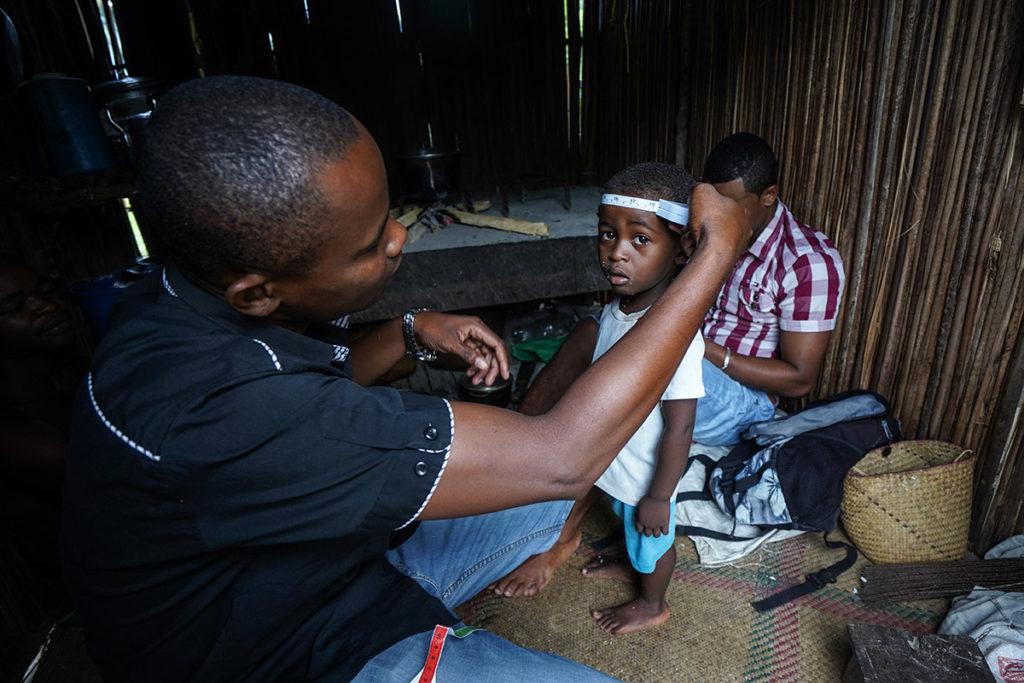 We have the intellectual capital. We have the partnerships. We understand the urgency of our work for millions of people across Madagascar and worldwide. All we need is you.
We have the intellectual capital. We have the partnerships. We understand the urgency of our work for millions of people across Madagascar and worldwide. All we need is you.
With your help, Madagascar will become a shining example of how commitment to public and planetary health improves human wellbeing—an example that lights the way for other governments. Your support for Climate-Smart Public Health will have exponential impact all over the world.
Click here to support this initiative



